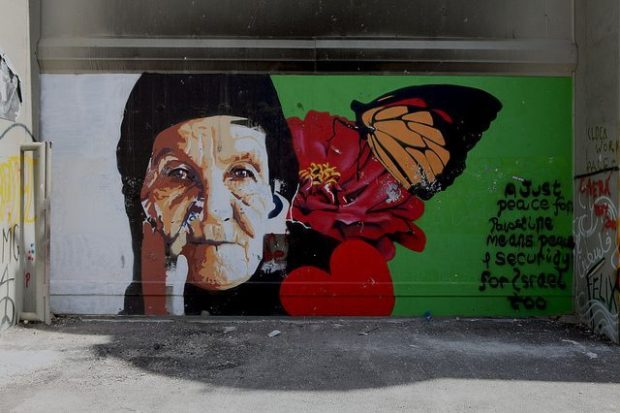
By Hannah Brandt
A Fresno State student recently back from Palestine spoke at the Reedley Peace Center on Jan. 15, 2016. She was born and grew up partially in the U.S., living first in New York City and later the Bay Area, before coming to Fresno five years ago to attend CSU Fresno. Since her parents were originally from Jerusalem, however, the family moved back in 1999, just before the Second Intifada or uprising. She remained there until 2006.
Her father was born in Palestine in 1948, the year of the Nakba, or catastrophe in Arabic, when more than 700,000 Palestinian Arabs fled or were expelled from their homes by Israelis in the Arab-Israeli War. Hundreds of towns and villages were destroyed in what is now called Israel. Palestinian refugees fled into Jordan, Lebanon and Syria, as well as what is now called the West Bank and Gaza Strip. They have never been able to return to their properties although many still have the keys.
Her parents married in 1966, just a year prior to the 1967 War. Her mother gave birth to her older brother only three days before Israeli troops descended on their village. Many babies died in the stampede of people, miscarriages were common. Israeli soldiers executed parents grieving their babies’ deaths, or she said, even for flinching. Israel commandeered Palestinian shops for barracks, destroying them. Her parents told her that soldiers used her brother’s diapers as toilet paper and defecated on his crib.
Since it was calmer by 1999, the family tried to rebuild their lives there. With a U.S. passport she experienced different treatment than her Palestinian peers without one. When she was on a school field trip that year, their bus was pulled over in Ramallah. After waiting for hours at this improvised Israeli checkpoint, she had had enough and flipped off a soldier through the bus window. He stormed in, but once he saw her American passport, he let the bus go.
While her uncle was praying at the Muslim holy site, Al-Aqsa mosque, one day in Sept. 2000, then Israeli prime minister Ariel Sharon and his troops barged into the mosque. People were locked inside the mosque, mobile phone access was cut off by Israeli forces, and people were unable to attend school and work because of roadside checkpoints set up to interrogate Palestinians. She knew people who died that day. It touched off the Second Intifada, which lasted until 2005.
In 2002, the wall dividing Palestinians from Israel was erected. It means Gaza Strip is now completely cut off from land, 90% of Gaza’s aquafer is unsafe for human consumption, no medical supplies are allowed through, and 80% of its 1.8 million residents rely on international assistance. The blockage of Gaza has been in effect for thirteen years.
In 2006, she decided to return to the U.S. while her parents stayed on there. Israel would not renew her visas and wouldn’t give her a Palestinian identification either. It took her ten years to go back. She says one of Israel’s tactics is forced immigration with the refusal to let Palestinians return, especially when coupled with interrogation.
When she flew from Athens to Tel Aviv to visit her family she was manhandled by female Israeli security who threw all her belongings out of her luggage. Despite her reserved row 10 seat, she was forced to the very last row. She said she felt like Rosa Parks. Once she arrived in Tel Aviv, she was interrogated for three hours, so long her father almost gave up and left the airport.
She says she cannot walk in Palestine anymore. Israeli soldiers release wild boars, hyenas and wild dogs into the streets to scare them. Walls with watch towers loom like a prison, causing many hours of extra commute, checkpoints across the streets from each other harass Palestinians anytime they want to go into increasingly expanding Israeli territories. They surround Al- Aqsa mosque.
She showed photos of how the wall now cuts into her family’s property on the constantly changing border line. It did not in 2006. It was not on the Green Line, not in accordance with the Geneva Convention. Through aggressive settlement, Israel continues to take more land to preserve a Jewish state. Many Israeli homes are on top of mass graves of Palestinians.
When she wears a pendant of her homeland she is often asked by Americans, “Why are you wearing Israel around your neck.” She says, “It is not Israel. It is Palestine.”
*****
Hannah Brandt is the editor of Community Alliance newspaper. Contact her at editor@fresnoalliance.com or hrbananah@gmail.com. Follow her on Twitter and Instagram @HannahBP2.
